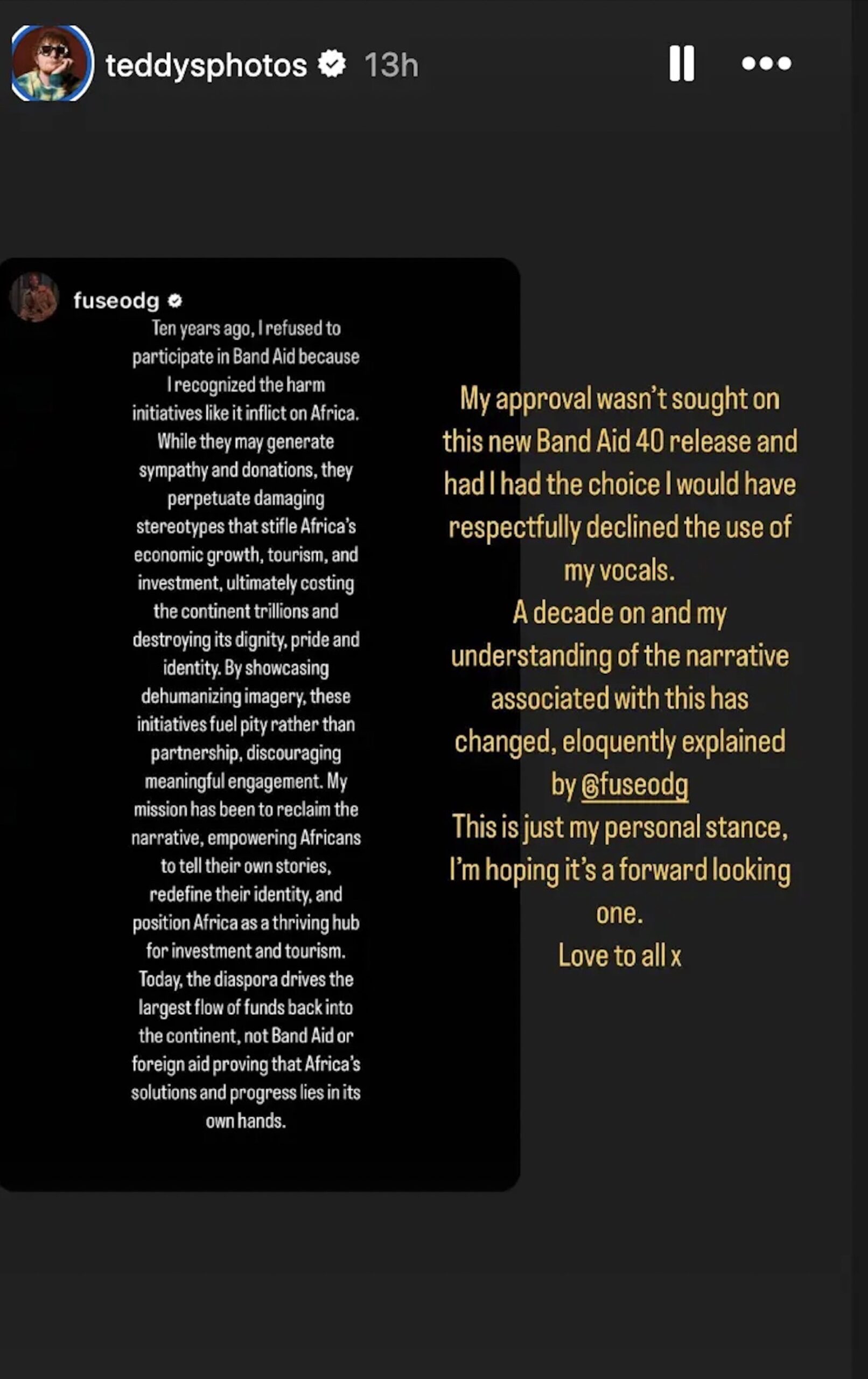
Ed Sheeran has spoken out about the new Band Aid single, and said that he would have declined to take part, if he had been asked for permission.
News of a new charity single was shared last week, when it was confirmed that a ‘2024 Ultimate Mix’ version of ‘Do They Know It’s Christmas?’ would be arriving later this month in celebration of the original’s 40th anniversary.
The new mix of the song, produced by Trevor Horn, brings together all of the voices from three versions of the track, recorded in 1984, 2004 and 2014.
Voices included in the anniversary edition include Sting, Boy George, Sam Smith, George Michael, Harry Styles, Chris Martin, Elbow‘s Guy Garvey, Sugababes, Bananarama, Seal, Sinéad O’Connor, Rita Ora, Robbie Williams, Kool and the Gang, Underworld and more. It also comes with a house band comprising Paul McCartney, Sting, Duran Duran‘s John Taylor (bass), Phil Collins, Roger Taylor, Danny Goffey (drums), Thom Yorke (piano), Paul Weller, Damon Albarn, Midge Ure, Johnny Greenwood, Gary Kemp and Justin Hawkins (guitar).
However, in a new update shared online, Ed Sheeran has spoken out about his feature on the track, and said that if he had been asked for permission to use his vocals, he would have declined.
The pop star sang alongside One Direction, Sam Smith, Coldplay and more in the 2014 edition of the charity Christmas single.
Recommended
“My approval wasn’t sought on this new Band Aid 40 release. Had I had the choice I would have respectfully declined the use of my vocals,” he wrote on Instagram Stories.
“A decade on and my understanding of the narrative associated with this has changed, eloquently explained by @fuseodg,” he continued. “This is just my personal stance, I’m hoping it’s a forward-looking one. Love to all x.”
In the update, Sheeran also shared a screenshot of a post made by Fuse ODG – who he mentioned in his statement – who explained why he turned down the offer to contribute to the 2014 version.
In his reasoning, he explained how the efforts to raise money for Africa also led to “perpetuat[ing] damaging stereotypes” on the continent. “I refused to participate in Band Aid because I recognised the harm initiatives like it inflict on Africa,” he began.
“While they may generate sympathy and donations, they perpetuate damaging stereotypes that stifle Africa’s economic growth, tourism, and investment, ultimately costing the continent trillions and destroying its dignity, pride and identity.”
Fuse ODG also went on to say that charity work like Band Aid “fuel pity rather than partnership”, and suggested that he’d rather see people across Africa “reclaim the narrative” and “tell their own stories, redefine their identity, and position Africa as a thriving hub for investment and tourism.”
NME has reached out for a comment from Band Aid.
The idea for the charity single was masterminded by Bob Geldof and Midge Ure, and sought to raise money for the Ethiopian famine. It sold a million copies in its first week and, at the time, was the fastest-selling single in UK chart history.
In total, it raised £8million for famine relief efforts, and was later followed up by Band Aid II five years later.
As highlighted by BBC News, Sheeran and Fuse ODG are far from the only ones to have taken a more critical stance towards the concept in recent years.
Back in 2003, Indrajit Samarajiva [writer, blogger and entrepreneur] claimed that the imagery of Africa depicted in the single came from an “ignorant and colonial attitude”, and was “more about making white people feel good than helping anyone”.
In retaliation to backlash over the weekend, Sir Bob Geldof addressed the criticisms of Band Aid and said (via 1News): “This little pop song has kept hundreds of thousands if not millions of people alive.”
“In fact, just today Band Aid has given hundreds of thousands of pounds to help those running from the mass slaughter in Sudan and enough cash to feed a further 8,000 children in the same affected areas of Ethiopia as 1984,” he added.
“Those exhausted women who weren’t raped and killed and their panicked children and any male over 10 who survived the massacres and those 8,000 Tigrayan children will sleep safer, warmer and cared for tonight because of that miraculous little record. We wish that it were other but it isn’t. ‘Colonial tropes’, my arse.”


 126
126